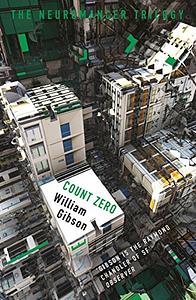You need to sign in or sign up before continuing.
Take a photo of a barcode or cover
This turned out to be my least favorite of the Sprawl trilogy. However, it is--like all of Gibson's work--compelling and easy to read. He investigates power and class with slick prose. But what caught my attention was the way he uses voodou; it is about "getting things done" with "street religion" in a technological world.
I feel like I've read the Sprawl series as a set of flashbacks. I started with the most recent, Mona Lisa Overdrive, slammed all the way back to Nueromancer, and then wound up filling in the final blanks in the middle. I don't know if it's because I have all the pieces now or just the way this one was put together, but Count Zero is my favorite of the three. (The only big flaw being the complete lack of Molly).
But what's not to like? Corporate rule may be my "favorite" form of dystopia in fiction - it's just so god damned possible these days - and Gibson loves it as much as I do. There's less out and out techbabble and more story (necessary, I guess, when you have at least three plot lines tangling up together and no dearth of worthwhile characters to follow) - although, as usual with the godfather of cyberpunk, most of the techy stuff is right on the nose some 20+ years later.
From what I understand, the reason Gibson let his image of the internet wander so far is that he really didn't have much of a clue about computers when he started writing these things. He heard a few things about it, came up with ideas that sounded cool to him, and went with it. That's how he wound up presenting us with steampunk computers and fractured AI personalities mimicking Vodun spirits and the web itself as a sort of shared hallucination of infinite space and possibility. He didn't know what was considered impossible, so he went ahead and invented it anyway.
Having finished all three of his Sprawl novels, I'd like to see a book of short stories by different authors set in that vast urban landscape. Jack Womack, China Miéville, maybe even someone like Haruki Murakami. Just an idea.
final thought: Putting aside his agile story-telling, his amazing tech predictions, and his ability at world-building, you know what I really do appreciate about Gibson? He offers a sort of hope for his characters at the end, and us through them. Not everyone makes it, but those who do are often better off, thanks to dumb luck and their own effort, at the end than they are at the beginning. And after 8 months of nearly unmitigated dark resolutions, that's something worth having.
(epicdystopia.blogspot.com)
But what's not to like? Corporate rule may be my "favorite" form of dystopia in fiction - it's just so god damned possible these days - and Gibson loves it as much as I do. There's less out and out techbabble and more story (necessary, I guess, when you have at least three plot lines tangling up together and no dearth of worthwhile characters to follow) - although, as usual with the godfather of cyberpunk, most of the techy stuff is right on the nose some 20+ years later.
From what I understand, the reason Gibson let his image of the internet wander so far is that he really didn't have much of a clue about computers when he started writing these things. He heard a few things about it, came up with ideas that sounded cool to him, and went with it. That's how he wound up presenting us with steampunk computers and fractured AI personalities mimicking Vodun spirits and the web itself as a sort of shared hallucination of infinite space and possibility. He didn't know what was considered impossible, so he went ahead and invented it anyway.
Having finished all three of his Sprawl novels, I'd like to see a book of short stories by different authors set in that vast urban landscape. Jack Womack, China Miéville, maybe even someone like Haruki Murakami. Just an idea.
final thought: Putting aside his agile story-telling, his amazing tech predictions, and his ability at world-building, you know what I really do appreciate about Gibson? He offers a sort of hope for his characters at the end, and us through them. Not everyone makes it, but those who do are often better off, thanks to dumb luck and their own effort, at the end than they are at the beginning. And after 8 months of nearly unmitigated dark resolutions, that's something worth having.
(epicdystopia.blogspot.com)
fast-paced
adventurous
challenging
mysterious
tense
fast-paced
Plot or Character Driven:
Plot
Strong character development:
Complicated
Loveable characters:
Complicated
Diverse cast of characters:
Yes
Flaws of characters a main focus:
Complicated
adventurous
mysterious
medium-paced
Plot or Character Driven:
Plot
Diverse cast of characters:
Yes
Flaws of characters a main focus:
No
An extremely disjointed plot. A frustrating cadre of characters and lackluster development very common with older scifi. Unnecessarily gratuitous world building that is sometimes punctuated with thoughtful introspection of how technology and society could develop if given similar circumstances.
Given the 3 main plot lines, the only one that I cared about was Marly's. And even that didn't go anywhere....
Oh, Gibson. With The Neuromancer, I felt that you were st your prime. With Count Zero, I felt you would have matured wonderfully. Unfortunately, I was wrong.
This wasn't an enjoyable read. It felt obligatory and unnecessarily thick for a sub 300 page novel. The prose is dense and deeply mired in descriptions that do not pay off in the slightest. It's a stylistic experimentation, one that overloads the readers and tires them out.
Maybe Count Zero will work for some readers. But, for me, I can say with certainty, it did not. Forever in the shadow of The Neuromancer, the sequel seems to have got too far ahead of itself.
With this, I think, I am done with The Sprawl Trilogy. Unless some miraculous level of introspection and reflection brings me back into the fold, I think I'll leave Mona Lisa Overdrive alone.
Given the 3 main plot lines, the only one that I cared about was Marly's. And even that didn't go anywhere....
Oh, Gibson. With The Neuromancer, I felt that you were st your prime. With Count Zero, I felt you would have matured wonderfully. Unfortunately, I was wrong.
This wasn't an enjoyable read. It felt obligatory and unnecessarily thick for a sub 300 page novel. The prose is dense and deeply mired in descriptions that do not pay off in the slightest. It's a stylistic experimentation, one that overloads the readers and tires them out.
Maybe Count Zero will work for some readers. But, for me, I can say with certainty, it did not. Forever in the shadow of The Neuromancer, the sequel seems to have got too far ahead of itself.
With this, I think, I am done with The Sprawl Trilogy. Unless some miraculous level of introspection and reflection brings me back into the fold, I think I'll leave Mona Lisa Overdrive alone.
adventurous
dark
mysterious
tense
Plot or Character Driven:
A mix
Strong character development:
No
Loveable characters:
No
Diverse cast of characters:
Yes
adventurous
fast-paced
Plot or Character Driven:
Plot
While the writing is several notches above standard sci fi, I found this book really hard to follow. I was confused for the first half and the ending didn't really clear much up.
The end of this book was a big disappointment after all the build-up. It's been probably 18 years since I read it though, maybe I should try again.
At any rate, the ending is the only reason I don't rate it higher.
At any rate, the ending is the only reason I don't rate it higher.




